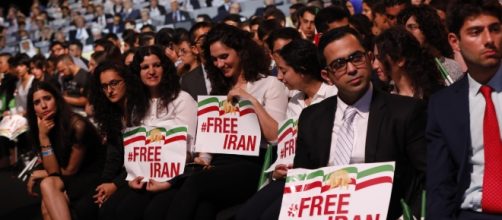It has now been more than two years since the United States led the way in the negotiation of a nuclear agreement between Iran and the five permanent members of the UN Security Council plus Germany. Although the agreement itself continues to cling to life, nothing has happened during that time to justify the optimistic narratives that surrounded its negotiation. The previous administration led some allies to believe that the Joint Comprehensive Plan of Action (JCPOA) would initiate a new era in Iranian-Western relations. But two years after that era was supposed to start, the regime's anti-Western rhetoric remains as intense as ever.
The current administration has made it clear that it recognizes a much broader context for the nuclear deal, which must be addressed at the same time that the agreement is vigorously enforced. The JCPOA simply disregarded issues like Iran’s ballistic missile program, its provocative gestures against regional and global adversaries, its world-leading support for terrorism, and its domestic human rights abuses. It was not part of a comprehensive strategy.
A shift in Iran policy is necessary
US Ambassador to the UN Nikki Haley has correctly warned the Security Council about the “true nature” of the Iranian regime. But the Trump administration should also be encouraged to go much further along the path it has started on with its several recent announcements of new economic sanctions.
At the very least, it is important that the latest sanctions prove to only be the beginning of a more broad-ranging series of restrictions on where Iran’s newly acquired foreign capital can end up.
Furthermore, President Trump has pointed in the direction of such measures very early in his presidency when he directed the State Department to examine the possibility of designating the Islamic Revolutionary Guard Corps (IRGC) as a Foreign Terrorist Organization. And to its own credit, Congress responded more recently by introducing legislation to extend all terrorism-related sanctions to the IRGC as a whole, thereby blacklisting it from a great deal of the global economy, which is expected to pass in both chambers this week, demonstrating that the need to confront the Iranian regime is a bipartisan issue.
The benefits of restraining Iran’s regional behaviors will far outweigh any drawbacks that come of encouraging the regime to violate the nuclear deal.
Sanctions legislation hurts the regime, helps the people
Following the State Department’s comments on a comprehensive policy review, the main opposition the National Council of Resistance of Iran (NCRI) released a statement affirming its own support for sanctions legislation, adding that “a majority of the people of Iran and of the region demand the designation of the IRGC as a Foreign Terrorist Organization.”
It stands to reason that the Iranian populous would also support international measures aimed at pushing the IRGC out of regional conflict zones, especially Syria and Iraq.
Measures such as these are prerequisites to solving virtually all of the crises currently keeping the Middle East mired in instability. This point was expressed in much greater detail at the NCRI’s major Free Iran gathering, which took place on July 1 in Paris, with the participation of tens of thousands of Iranian expatriates, plus hundreds of political dignitaries from around the world.
American luminaries like Rudy Giuliani, Newt Gingrich, Tom Ridge, and General George Casey delivered speeches at the event. After all, the policy articulated by Trump administration’s leading foreign policy officials is very much in tandem in what was articulated by NCRI’s charismatic president, Maryam Rajavi.
The administration has not taken steps to form appropriate alliances with the Iranian Resistance and, by extension, with the Iranian people. The continuation of emerging, assertive policies is the first thing that must arise out of the White House’s comprehensive review of its Iran policy. But the second thing is the acknowledgment of the transformative role that could be played by NCRI-affiliated activists who are already opposing the Iranian regime from within the country.
The US should not just seek to sanction and blacklist the IRGC because it is in the country’s vital national security interests, but also because it could create space for an already-organized Iranian Resistance movement to rise up and hasten the end of the Iranian regime.
That, in turn, would safeguard America’s vital national security interests not just for the life of the Trump administration and not just for the life of the Iran nuclear deal, but for the foreseeable future.


